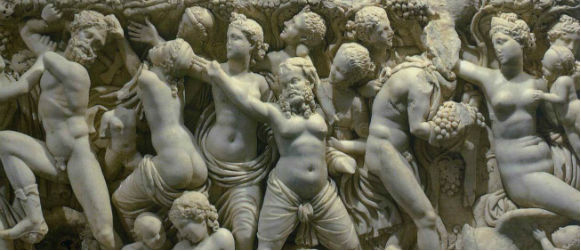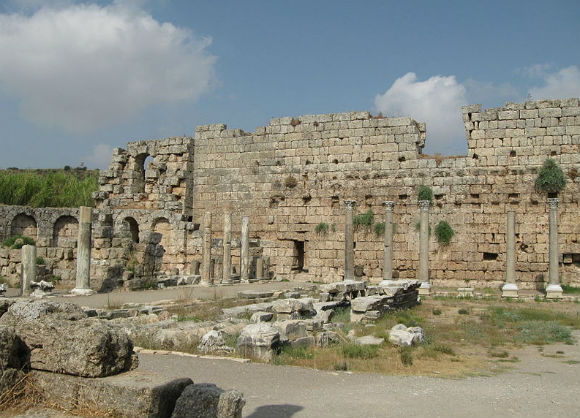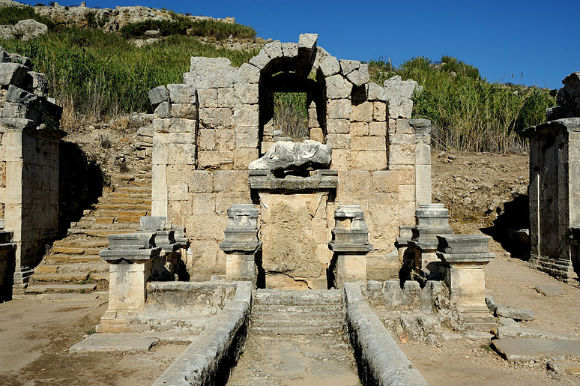Perga was an old city even in the first century. Its name (which is not Greek) indicates that its origin dates from pre-Greek times. Alexander the Great passed through it twice while the Pergaeans offered no resistance to him although it was a walled city with a citadel. In Roman times the main streets were over twenty-one meters wide. They were lined with Ionic colonnades and a water channel ran down their center in a series of small waterfalls as in Antalya today. Behind the colonnades stood the shops. Of the early buildings the stadium and the theater have survived the ravages of earthquakes and wars with the least damage. In fact this stadium which could seat about fourteen thousand people is one of the best preserved in Turkey.
The temple of the Pergaean Artemis according to a writer of the time was “a marvel of size, beauty, and workmanship.” Its location has yet to be established; it may have been where there are now ruins of a Byzantine church on a hill to the southeast of the city.
Perga is on a rise not far from the Cestrus River which was navigable In Paul’s time. It was not a seaport in terms of Its being directly on the Mediterranean even then, but rather it was more easily defended where it was: its distance from the open sea made it less vulnerable to piracy.
Two people stand out among the early residents of Perga. Apollonius was a third century B.C. astronomer and mathematician who believed that the movements of heavenly bodies in the universe were explainable by orbits within orbits: that the moon went around the earth as the earth went around the sun. He was much ahead of his time in his theories of astronomy, so much so that the ideas had to be rediscovered during the Renaissance. Plancia Magna was unusual for a second century A.D. woman: she held the highest city office during her life, that of demiurgus. She must have been well-to-do for a number of inscriptions record her gifts to the city.
Paul and Barnabas went through Perga on their way to and from Antioch on their first journey (Acts 13:13, 14:25). John Mark was with them at first but left them at Perga to return to Jerusalem. The reason for that must have been such that Paul doubted his commitment to the cause. Later when Paul and Barnabas were about to start on their second journey from Antioch they had a sharp dispute over his worthiness. Paul refused to have him go along, so John and Barnabas went to Cyprus while Paul chose Silas to accompany him.
Paul talks in II Corinthians 12:7 and in Galatians 4:13-14 of bodily illness that brought him to Galatia the first time. It may have been on that account that he did not stay long in Perga the first time. Whatever the illness was, it seems to have improved in time in the dry mountain air to the north.
The second theory of why they did not stay long in Perga is that their interview with Sergius Paulus, the proconsul of Cyprus, had made them want to hurry to the Roman colony in Antioch of Pisidia. This interpretation may lay too much stress on the lasting importance of that meeting with a cultured Roman who could have been more interested in the pursuits of the mind than the salvation, in Christian terms, of his soul. It is interesting, however, that this is” the point in Acts (13:9) that Luke begins to call Paul by his Roman name, not his Jewish “Saul”.
On their return they did stay in Perga long enough to preach and talk with people there. Nothing else is told about the city or their time there.
Perga,






A lot to see (and quickly if you go with a coach tour!). Can't believe how much still remains here. We saw it as well as Side and Aspendos on an organised coach tour, we would have liked more time to explore, say 1-2 hours. I would also have liked to look at the stadium in more detail but it…
Beautiful site, goes on and on, mixing so many traditions it is a little overwhelming. See it early before it gets too hot
This unlike a ancient ruin in the uk you could really climb into the past by geeting in to the city with no barriers or grumpy stewards saying do not touch. the guide was also fantastic
The sheer scale of Perge (and that's just what's been excavated so far) puts most of the ruins you'd see in Greece or Italy to shame. Second only to Ephesus in my view. I'd recommend going with a guide — there's so much there that needs explaining.
This antique town has both museum building and open-air museum. Some of the statues were stolen in near past. Because of climate ,you can easily visit anytime of the year(except heavy rain)My suggestion is :visit this town with a proffesional tourist guide.If you have a time, you can also visit another antique town where Alexander the Great never concoured.